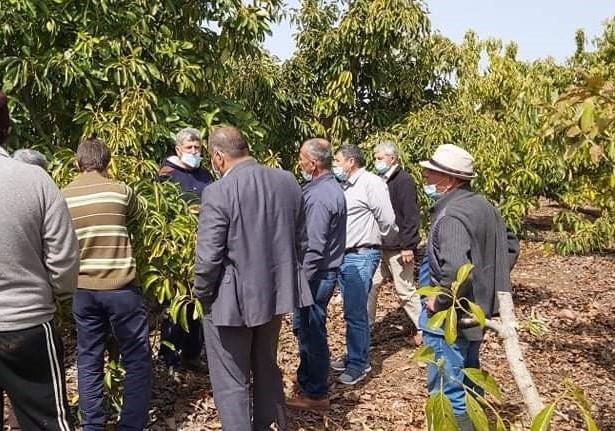Farmer Field Schools contribute to improving Avocado production in Qalqilya Governorate, Palestine

A Farmer Field School training session for avocado farmers in Qalqilya Governorate, Palestine, focuses on promoting best agricultural practices, allowing them to make the most from the important cash crop. ©FAO/Ayman Alem
Farmer Field Schools (FFS) have been used as a way to enhance local farming techniques through targeted capacity development activities delivered in the form of on-the-job training to Palestinian farmers. The Food and Agriculture Organization of the United Nations (FAO), under the regional project “Implementing the 2030 Agenda for water efficiency/productivity and water sustainability in NENA countries”, in collaboration with the Palestinian Ministry of Agriculture (MoA) and the Qalqilya Agricultural Directorate, began preparations to launch two avocado FFSs in Qalqilya Governorate, one in the north (Jayyus-Falamya district) and one in the south (Qalqilya-Habla district), which by February 2021 were active. Trainings are delivered to groups of 15 to 20 farmers and focus on imparting good agricultural practices related mainly to water usage, modern crop management methods, reduction of chemical pesticides and proper disease and pest control, resulting in decreased input costs and increased economic return and resilience of farmers, and enhanced water productivity per drop.
In early 2020, FAO’s project team received a request from Qalqilya Agricultural Directorate to establish an avocado FFS in Qalqilya Governorate, which was backed by MoA extension delivery services. By the middle of the year, the project team discussed the establishment of three new FFSs for strategic irrigated crops, two of which for avocados in Qalqilya Governorate and one for colored pepper in Tulkarm.
The cultivation of avocados in Qalqilya Governorate began in the mid-1980s and has gradually increased in popularity due to an increase in demand over the last decade in both local and international markets, making avocados an important cash crop with considerable profit for farmers in Palestine. The area enjoys a comparative advantage in growing the tropical tree that produces the fruit because of its favorable climate and access to freshwater. In a new study conducted by FAO office in the West Bank and Gaza Strip presented in late 2020 on fruit tree value chains in the region, the avocado demonstrated the highest potential for expansion for local markets and export.
Results following the establishment of the two avocado FFSs:
- Increased avocado crop farmlands
- Increased spread of new pests attracted to the crop, which negatively impacted production
- Provided up-to-date knowledge on the cultivation of avocado, especially with regard to irrigation, fertilization, pest control and new varieties
- Introduced new avocado varieties to ensure availability throughout the year
- Improved market competitiveness of the Palestinian avocado among others in the Middle East due to improved production quality
- Provided training on good practices for farmers, although agricultural advisory services remain in significant deficit
- Increased usage of chemicals and pesticides, some of which hazardous, by farmers, most of whom did not adhere to public safety measures regulating usage
- Increased input cost due to intensive use of water, fertilizers and pesticides, with pesticides alone amount to 35 percent of production costs
This activity is implemented under the regional project “Implementing the 2030 Agenda for water efficiency/productivity and water sustainability in NENA countries” directly under the Regional Water Scarcity Initiative. This project is funded by the Swedish International Development Cooperation Agency (SIDA).
